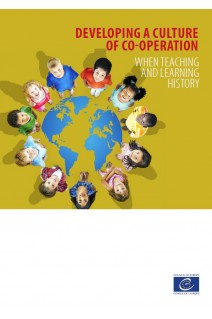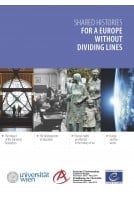



Developing a culture of co-operation when teaching and learning history is a bilateral history education project in Cyprus. The project aimed to raise awareness of teaching and learning history in its complexity in the context of cultural diversity and globalisation, based on multiperspectivity with a view of overcoming stereotypes and prejudices and strengthening reconciliation processes as reflected in Recommendation (2011)6 on Intercultural dialogue and the image of the other in history teaching, adopted by the Council of Europe Committee of Ministers in 2011; and to help Cypriot young people to develop, through teaching and learning history, the skills and attitudes that enable co-operative living. These skills and attitudes include open-mindedness, empathy, emotional intelligence, mutual respect, active listening and self-expression.
The educational book is the main outcome of the project. It is intended for use in teachers’ education, is suitable for any mode of teacher training, and is also designed for self-study. The book refers to external sources.
Key areas for the professional development of teachers are represented by seven training units:
Does differentiation have to mean different?
Developing empathy as an historical skill
Gender and inclusivity
Dealing with stereotypes
Societies living together
Using literature, art and film to aid historical understanding
Teaching history in a digital age
Each training unit comprises a theoretical part (‘Exploring the ideas’) and practical part (‘Applying the ideas’). This second part includes lesson plans and suggestions for teaching sequences. This tool is linked to the requirements of ongoing educational reform in Cyprus but also includes a wider perspective and a range of approaches which could be useful for history educators from other member states of the Council of Europe.
The book is available in English only.
The ideas and approaches developed in the book are directly linked to the on-going Council of Europe intergovernmental project Educating for diversity and democracy: teaching history in contemporary Europe.
PREFACE
INTRODUCTION
ACKNOWLEDGEMENTS
A CULTURE OF CO-OPERATION AND THE CO-OPERATION OF CULTURES: A CONCEPT PAPER
REFERENCES
TRAINING UNIT 1: DOES DIFFERENTIATION HAVE TO MEAN DIFFERENT?
PART ONE: EXPLORING THE IDEAS
Introduction
Objectives
Theoretical background and points to consider
Differentiation in the classroom
PART TWO: APPLYING THE IDEAS
Introduction
Historical context
Cypriot curriculum context
Teaching methodology
Teaching and learning sequence 1: When was Ottoman control over Cyprus at its height
Teaching and learning sequence 2: Differentiating frequently taught topics: The Siege of Nicosia
REFERENCES
TRAINING UNIT 2: DEVELOPING EMPATHY AS AN HISTORICAL SKILL
PART ONE: EXPLORING THE IDEAS
Introduction
Objectives
Theoretical background and points to consider
Exploring constructions and models of empathy in the classroom
PART TWO: APPLYING THE IDEAS
Introduction
The first example: The Battle of Lepanto: empathy to understand people’s thoughts and feelings
Historical background
Cypriot curriculum context: The first example
Teaching and learning sequence 1: Using historical empathy to understand actions at, and reportage of, a key event: The Battle of Lepanto
The second example: Appeasement, Neville Chamberlain’s dilemma:
Empathy to understand context, values, thinking and decision making
1930s appeasement: Historical background
Cypriot curriculum context: The second example
Teaching and learning sequence 2: Appeasement in 1930s: Empathy to understand actions
REFERENCES
TRAINING UNIT 3: GENDER AND INCLUSIVITY
PART ONE: EXPLORING THE IDEAS
Introduction
Objectives
Theoretical background and points to consider
Gender in the history curriculum
PART TWO: APPLYING THE IDEAS
Introduction
Cypriot context
Cypriot curriculum context
Teaching methodology
Teaching and learning sequence: Reading history through gendered statues
REFERENCES
TRAINING UNIT 4: DEALING WITH STEREOTYPES
PART ONE: EXPLORING THE IDEAS
Introduction
Objectives
Theoretical background and points to consider
Stereotypes in the history classroom
PART TWO: APPLYING THE IDEAS
Introduction
Activity 1: Interaction between cultures in Cyprus
Activity 2: Exploring generalised and stereotypical statements
Activity 3: Stereotyping people
Activity 4: Interpreting images and symbols
Activity 5: The identity of where we live
REFERENCES
TRAINING UNIT 5: SOCIETIES LIVING TOGETHER: UNDERSTANDING CULTURAL DIVERSITY IN TEACHING AND LEARNING HISTORY
PART ONE: EXPLORING THE IDEAS
Introduction
Objectives
Theoretical background and points to consider
What might a history curriculum that promotes an understanding of cultural diversity look like?
PART TWO: APPLYING THE IDEAS: ARCHAEOLOGY AS A WAY ON UNDERSTANDING CULTURAL DIVERSITY
The context
The Cypriot context
Using artefacts to develop historical knowledge and historical thinking
A model of student progression in working with artefacts
Developing relevant skills and historical concepts
Teaching and learning sequence: working with objects
REFERENCES
TRAINING UNIT 6: USING LITERATURE, ART AND FILM TO AID HISTORICAL UNDERSTANDING
PART ONE: EXPLORING THE IDEAS
Introduction
Objective
Theoretical background and points to consider
Using the arts in the classroom
PART TWO: APPLYING THE IDEAS
Aiding historical understanding using literature
Aiding historical understanding using art
Aiding historical understanding using film
REFERENCES
TRAINING UNIT 7: INFORMATION COMMUNICATIONS TECHNOLOGY AND HISTORY TEACHING
PART ONE: EXPLORING THE IDEAS
Introduction
Objectives
Theoretical background and point to consider
ICT in teaching and learning
Practical uses of ICT in the history curriculum
PART TWO: APPLYING THE IDEAS
Introduction
Cypriot curriculum context
Using ICT to start a learning sequence
Teaching and learning sequence 1: Making a short radio style report on The Siege of Nicosia, 1571
Teaching and learning sequence 2: Making a short TV style documentary on The Ottoman Period in Cyprus
Teaching and learning sequence 3: Making a stop-motion video about the Battle of Lepanto
Teaching and learning sequence 4: Using the internet for research in support of sophisticated thinking on historical significance
Teaching and learning sequence 5: Using web searches critically to question representation and interpretations
Teaching and learning sequence 6: Multimedia presentations to present a local history enquiry: ‘Historic Cyprus, Meeting Point of Cultures’
AUDITING TOOL: HISTORY TEACHERS’ USE OF ICT IN THEIR TEACHING
Use of ICT in teaching
REFERENCES


Developing a culture of co-operation when teaching and learning history is a bilateral history education project in Cyprus. The project aimed to raise awareness of teaching and learning history in its complexity in the context of cultural diversity and globalisation, based on multiperspectivity with a view of overcoming stereotypes and prejudices and strengthening reconciliation processes as reflected in Recommendation (2011)6 on Intercultural dialogue and the image of the other in history teaching, adopted by the Council of Europe Committee of Ministers in 2011; and to help Cypriot young people to develop, through teaching and learning history, the skills and attitudes that enable co-operative living. These skills and attitudes include open-mindedness, empathy, emotional intelligence, mutual respect, active listening and self-expression.
The educational book is the main outcome of the project. It is intended for use in teachers’ education, is suitable for any mode of teacher training, and is also designed for self-study. The book refers to external sources.
Key areas for the professional development of teachers are represented by seven training units:
Does differentiation have to mean different?
Developing empathy as an historical skill
Gender and inclusivity
Dealing with stereotypes
Societies living together
Using literature, art and film to aid historical understanding
Teaching history in a digital age
Each training unit comprises a theoretical part (‘Exploring the ideas’) and practical part (‘Applying the ideas’). This second part includes lesson plans and suggestions for teaching sequences. This tool is linked to the requirements of ongoing educational reform in Cyprus but also includes a wider perspective and a range of approaches which could be useful for history educators from other member states of the Council of Europe.
The book is available in English only.
The ideas and approaches developed in the book are directly linked to the on-going Council of Europe intergovernmental project Educating for diversity and democracy: teaching history in contemporary Europe.
